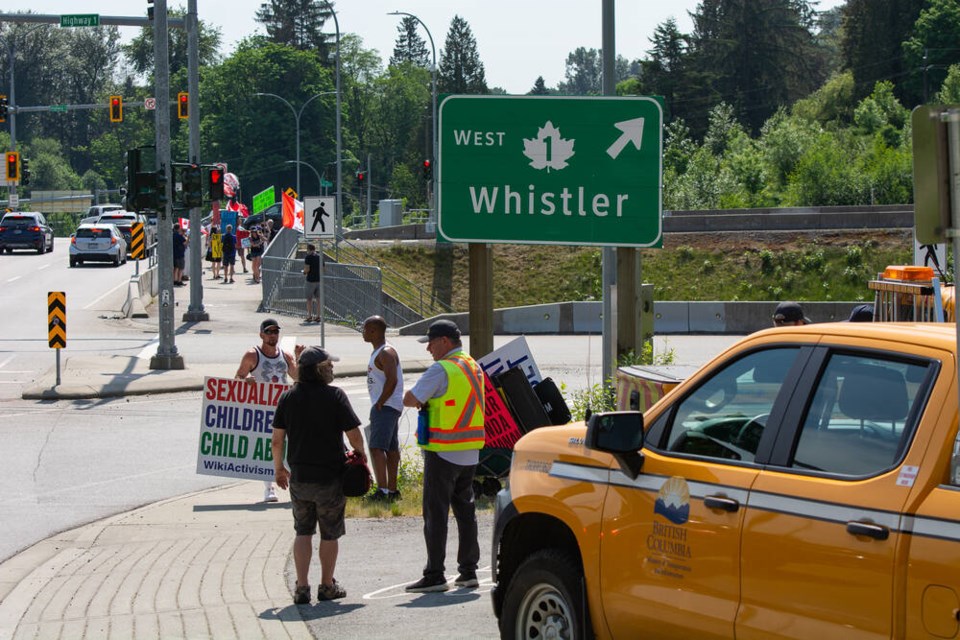There was more walking and less gathering than in previous weeks on a controversial strip of concrete in North Vancouver, May 18.
On Thursday afternoon – the time a group regularly demonstrates on the Mountain Highway overpass – most of the protesters were dispersed along the walkways rather than gathered above the Highway 1 traffic below, . The railing of the pedestrian walkway, usually adorned with a number of large signs, was clear this week.
An injunction issued May 11 by B.C. Supreme Court prohibits anyone from gathering on or occupying the overpass, but people are still allowed to pass through.
“According the injunction, it says as long as you’re moving, traversing, its falls under legal right of the public to traverse, to walk back and forth,” said Sgt. Dave Smith, a member of BC RCMP’s Division Liaison Team, a special police unit that negotiates with demonstrators. Several officers from the team were on scene this week, dressed in their casual, bluish-grey uniforms.
Smith said his team had advised the overpass group that if officers believed they are in violation of the injunction, they may be videotaped and their identity may be known. “And at a later date, they can be charged for breach conjunction,” Smith said.
“We’re trying to educate them, to be safe because the [Ministry of Transportation and Infrastructure] is worried about a car accident,” he added. “Something falling on [the highway], distracted driving, it just takes one second. And we’re here basically to enforce that, the rule of law.”
Enforcement of the court order is at their discretion, Smith continued. “The last thing we want to do is have to arrest anyone. We want to convince people to have a peaceful, lawful display and protest.”
Staff from the Ministry of Transportation were also on site, along with local police. Const. Mansoor Sahak of North Vancouver RCMP said no arrests have been made.
“We’ve communicated with the protesters and so far they’ve been able to remove their signs from the railings and not put any signs on the overpass, which is a safety hazard for commuters who are going home now,” Sahak said.
Accusing trans people and non-trans educators of being groomers 'puts a target on our backs'
Lynn Valley resident Marijke-Louie Pattrick has been coming to the demonstrations since last November.
She said police had instructed them to keep walking, to not hang banners, as well as not to congregate or even talk on the overpass. “I was nervous to be honest,” Pattrick said. “I don’t want to get arrested.”
She and a few others had walked back and forth, at one point holding up signs on the sidewalk south of the overpass near Keith Road.
Pattrick aligns with the group’s stances on anti-vaccination, government conspiracy and for sexual orientation and gender identity programming to be kept out of schools. One of their anti-SOGI signs has been denounced by officials as hateful.
“They say we’re hateful, we’re anti-[trans]. No,” she said. “The main thing is … we want the kids to be left alone.”
But others argue that it’s important to invest in resources like SOGI 123 – especially when it’s implemented with training for teachers – so that kids and their parents can make the best, informed decisions.
“Providing an option to a kid is not harming them,” said Andy Warner, a transgender woman who grew up in North Vancouver. “Ultimately it’s up to individual students and their families to choose for themselves.”
When she was growing up, going to Ecole Cleveland Elementary and Handsworth Secondary, there was no SOGI education in school, and none at home either among her conservative Christian family. That lack of knowledge and support made her transition more difficult later on, she said.
“When trans people are better represented in curriculum and in schools, it creates a positive impact for all youth to be able to recognize that it’s important to celebrate our differences,” Warner added.
And the “groomer” rhetoric used by the demonstrators is harmful, she continued.
“When you even suggest that trans people or non-trans educators and school teachers … are predators or we are child sex groomers, it puts a target on our backs and puts us at risk for even more danger than we already face in the world,” Warner said. According to , sexual minority and trans people in Canada are several times more likely to report physical or sexual assault in the last year.
The reason she considers the speech hateful “is because they are actively trying to suggest harm towards us and actively encouraging other people to believe that we are harming children without proof,” Warner said.




